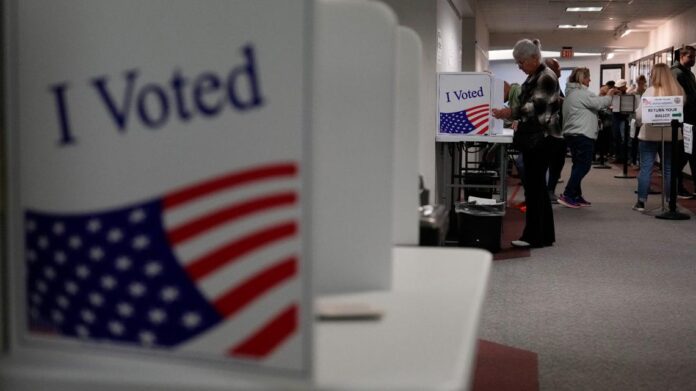Pennsylvania could be the pivotal swing state in the 2024 election. Here’s how the state makes sure its votes are counted accurately.
Pennsylvania, a crucial swing state, is often the subject of election-related misinformation. Social media users have falsely suggested that large numbers of migrants are illegally registering to vote in Pennsylvania, incorrectly asserted that the time it takes to count votes in the state is a smokescreen for fraud, and made baseless claims about foul play involving deceased voters.
Now, with just a week to go before Election Day, conspiracy theories and misinformation about voting across the U.S. have been resurgent. While voter fraud does occur, it’s rare and election officials have safeguards to catch it.
“This just comes up over and over again, these concerns about the election system,” said Daniel Mallinson, an associate professor of public policy and administration at Penn State. “All these claims of coordinated voter fraud or noncitizens voting in large numbers, there just isn’t evidence of that.”
Here’s a closer look at the facts.
NONCITIZEN VOTING
The specter of immigrants voting illegally in the U.S. has become a leading election-year talking point for Republicans. But voting by people who are not U.S. citizens already is illegal in federal elections and there is no indication it’s happening anywhere in significant numbers. And Pennsylvania, like many states, prohibits noncitizens from voting in elections for state offices.
A 1996 federal law allows fines and imprisonment for up to a year for noncitizens who vote in federal elections. Violators can also be deported. When people in the U.S. register to vote, they swear under penalty of perjury that they are U.S. citizens.
In Pennsylvania, only people who meet various requirements, including citizenship, can register to vote. Under the state constitution, a voter must “have been a citizen of the United States at least one month,” in addition to meeting state and voting district residency requirements.
In 2017, Pennsylvania acknowledged it had to fix a glitch that allowed noncitizen immigrants to register to vote when getting a driver’s license. At one point, state election officials said noncitizen immigrants may have cast 544 ballots illegally — out of more than 93 million ballots in elections spanning 18 years, going back to 2000.
Since the fix, Pennsylvania’s voter registration process “has been a lot cleaner,” said Philadelphia City Commissioner Seth Bluestein, who serves on the board overseeing elections in the city.
“We are always paying attention to voting irregularities and investigating potential fraud. And we’ve seen no evidence of widespread noncitizen voting in Philadelphia,” Commissioner Bluestein added.
DECEASED VOTERS
Pennsylvania is among nine states that have statutes that prohibit counting absentee ballots that were submitted by voters who die before Election Day, according to the National Conference of State Legislatures. Ten states have laws that explicitly allow counting absentee ballots cast by voters who die before Election Day.
County election officials in Pennsylvania regularly update their voter registration lists when voters die. The Pennsylvania Department of Health transmits data on resident deaths to the Pennsylvania Department of State, and counties use that data to remove deceased individuals from their voter rolls, Mark O’Neill, a spokesperson for the Department of Health, wrote in an email.
Pennsylvania law allows counties to use information from the health department, published obituaries, and testamentary documents to confirm that a voter has died, according to Geoff Morrow, a spokesperson for the Pennsylvania Department of State.
“Once a voter is marked deceased, the ballot, if returned, cannot be accepted,” said David Voye, division manager for the Allegheny County Elections Division.
Pennsylvania election code states that election results can’t be invalidated just because a recently deceased voter’s mail ballot is included in the count, according to Morrow.
In 2021 a Pennsylvania man who illegally voted for Donald Trump on behalf of his long-dead mother in the 2020 election was sentenced to five years of probation. But such cases are “exceptionally rare,” said Veronica Degraffenreid, senior manager of strategic partnerships in the elections and government program at the Brennan Center and Pennsylvania’s former acting secretary of state.
“There are not, you know, gangs of bad actors co-opting dead voters’ identities,” said Forrest Lehman, Lycoming County’s director of elections.
COUNTING VOTES
In past elections, false and misleading claims have focused on the time it takes Pennsylvania counties to count votes. But such claims misrepresent why the process is relatively slow.
Under Pennsylvania law, elections officials must wait until 7 a.m. ET on Election Day before they can begin to process ballots cast by mail and prepare them to be counted. The release of mail voting results cannot begin until after polls have closed. Because of the overall volume of mail ballots — they comprised almost a quarter of the total vote in the 2022 midterm elections — and the varying amounts of time it takes the state’s 67 counties to tally these votes, determining a winner in a highly competitive race could take several days, as it did in the 2020 presidential election.
“We’re one of the few states that has a form of early voting, but we don’t have any pre-processing of those ballots,” Mallinson said. “This is not fraud that’s occurring. This is just simply the the time it takes to process these ballots.”
